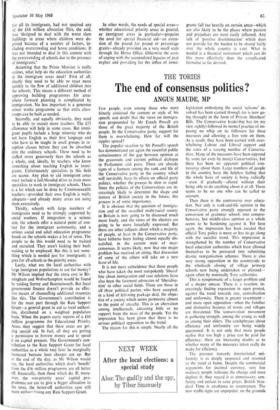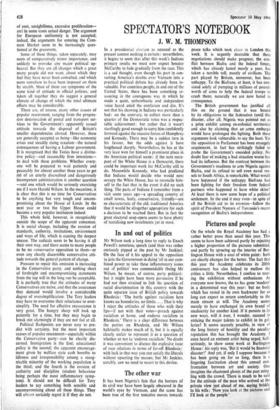The end of consensus politics?
THE TORIES ANGUS MAUDE, MP
Few people, even among those who most bitterly criticised the content or style of his speech, can doubt that the views on immigra- tion propounded by Mr Enoch Powell are those of the great majority of the British people. In the Conservative party, support for them is overwhelming. How far will the ripples spread?
The popular reaction to Mr Powell's speech has demonstrated yet again the resentful public consciousness of the gap between opinion at the grassroots and current political dialogue in Parliament and press. There are already signs of a ferment among the rank and file of the Conservative party in the country which will inevitably have its effects on official party politics, whether the process be slow or rapid. Since the policies of the Conservatives are in- creasingly likely to determine the shape and texture of British society in the future, this process is of some importance.
It is obvious that the question of immigra- tion and of the so-called multi-racial society in Britain is now going to be discussed much more freely, and the views of the electors are going to be more forcefully expressed. But there are other subjects about which a majority of people, at least in the Conservative party, have hitherto been feeling almost equally dis- satisfied, in the current state of near- consensus. It seems likely, now that one major problem has received an airing, that discussion of some of the others will take on a new lease of life.
It is not mere coincidence that those people who have taken the most outspokenly 'liberal' line about immigration and race relations have also been the foremost advocates of 'liberalisa- tion' in other social fields. There are those in all three political parties who have accepted, in a kind of left-wing package deal, the objec- tive of a society which seems permissive almost to the point of anarchy. This is an aberration among intellectuals, attracting little or no support from the mass of the people. Yet the impression has been given that there is no serious political opposition to the trend.
The reason for this is simple. Nearly all the
legislation embodying the social 'reforms' in- volved has been carried through (or is now go-
ing through) in the form of Private Members' Bills. The Conservative leadership has (in my view rightly) followed its normal practice of im- posing no whip on its followers for these measures and allowing a free vote on them. As a result, they have been carried with over- whelming Labour and Liberal support and the votes of a varying number of Conserva- tives. Many of the measures have been opposed by some (or even by many) Conservatives, but there has been no apparent political con- troversy about them. Large numbers of people in the country have the helpless feeling that the whole basis of society is being radically —even if gradually—altered without their being able to do anything about it at all. There seems to be no one who can be called to account.
Then there is the controversy over educa- tion. Not only is rank-and-file opinion in the Conservative party strongly opposed to the conversion of grammar schools into compre- hensives, but middle-class opinion as a whole seems to be hardening against it. Yet here again, the impression has been created that official Tory policy is more or less to go along with the socialist trend. This impression is strengthened by the number of Conservative local education authorities which have allowed themselves to be pressured into submitting drastic reorganisation schemes. There is also very strong opposition in the countryside to the wholesale closing of village primary schools now being undertaken or planned— again often by nominally Tory authorities.
This is symptomatic of a larger problem and of a deeper unease. There is a reaction, in- creasingly finding expression in open protest, against the trend towards size, centralisation and uniformity. There is greater resentment— and more open opposition—when the familiar and distinctive features of towns and villages are threatened. The 'conservation' movement is gathering strength, among the young as well as among their elders. The catchphrases about efficiency and uniformity are being widely questioned. It is not only that more people realise that too high a price can be paid for efficiency; there are increasing doubts as to whether many of the measures taken really do make for efficiency.
The pressure towards international uni- formity is as deeply suspected and resented as the trend at home. Despite the commercial arguments for decimal currency, very few ordinary people welcome the change and most deplore it; they regard it as unnecessary, con- fusing and certain to raise prices. British Stan- dard Time is anathema to countrymen. The new traffic signs are unpopular, on the grounds of cost, unsighdiness, excessive proliferation— and in some cases actual danger. The argument for European uniformity is not accepted; indeed, the arguments for entering the Com- mon Market seem to be increasingly ques- tioned at the grassroots.
Some of these things, taken separately, may seem of comparatively minor importance, and unlikely to provoke any major political up- heaval. But they are all changes which a great many people did not want, about which they feel they have never been consulted, and which seem somehow to have been imposed on them by stealth. Most of them are symptoms of the same kind of attitude in official policies, and taken all together they do suggest a general climate of change of which the total ultimate effects may be considerable.
There are, of course, many other causes of popular resentment, ranging from the progres- sive deterioration of postal and transport ser- vices to the Government's apparently casual attitude towards the disposal of Britain's smaller dependencies abroad. However, these are generally accepted as being—like economic crises and steadily rising taxation—the natural consequences of having a Labour government. It is recognised that the Tories have a distinc- tive policy—and reasonably firm intentions— to deal with these problems. Whether every- one will be prepared to wait patiently and peaceably for almost another three years to get rid of an utterly discredited and dangerously incompetent administration is another question —and one which would be seriously exercising me if I were Harold Wilson. In the meantime, it is clear that this is no time for Conservatives to be anything but very tough and uncom- promising about the House of Lords. In the next year or two the Upper House could become a very popular institution indeed.
This whole field, however, is recognisably outside the scope of the apparent consensus. It is social change, including the erosion of standards, authority, institutions, environment and ways of life, which is causing the deepest unease. The radicals seem to be having it all their own way, and there seems to many people to be no conservative opposition to them—or even any clearly discernible conservative atti- tude towards the general pattern of change.
Pressure to repair this omission is increasing in the Conservative party, and nothing short of forthright and uncompromising statements from the top will in the long run be acceptable. It is perfectly true that the attitudes of many Conservatives are naive, and that the assurances they demand would involve a considerable degree of oversimplification. The Tory leaders may have to overcome their reluctance to over- simplify. The need for effective reassurance is very great. The hungry sheep will look up patiently for a time, but they may begin to break out alarmingly if they are not fed at all.
Political flashpoints are never easy to pre- dict with certainty, but the most important causes of popular resentment—especially within the Conservative party—can be clearly dis- cerned. Immigration is the first; educational policy is the second; the apparent encourage- ment given by welfare state cash benefits to idleness and irresponsibility among a recog- nisable minority of the working population is the third; and the fourth is the erosion of authority and discipline (student behaviour being perhaps the most inflammatory symp- tom). It should not be difficult for Tory leaders to say something both sensible and uncompromising about all these things. They will almost certainly regret it if they do not.







































 Previous page
Previous page